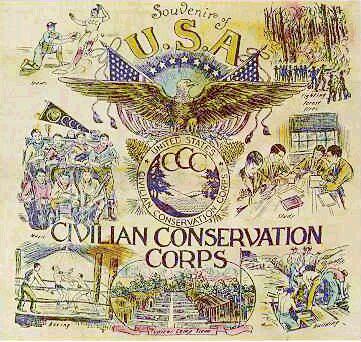
My father was a veteran of the Civilian Conservation Corps (CCC) and always spoke well of the experience. I enjoyed the fruits of the CCC labors, as trees they planted came to maturity just in time for me and I have always had a special fondness for the whole idea of the CCC. As a long time Federal worker, I am acutely aware of the limits of government, but the CCC was a big program that mostly worked. When I had my initial talk with our Ag guy Dennis, I told him that I wanted us to make a CCC style contribution, albeit a smaller one, to soil, water, flora & fauna of Iraq. He has come up with a big project.
Our area of operations is dusty desert with a ribbon of green along the Euphrates River. We do, however, have a beautiful lake, called Lake Qadisiya, which I wrote about in an earlier post. The waters of the lake provide for irrigation and produce hydroelectric power. In this hot, dry climate, substantial amounts of the water are lost to evaporation. The hot sun plays the dominant part, but dry winds have a significant supporting role. A belt of trees planted perpendicular to the prevailing winds would, according to Dennis, reduce evaporation loss, trap blowing dust and generally ameliorate the local microclimate. Date palms, being the most common tree around here, we thought of them. The date palms have the added advantage of supplying marketable fruit in the short term, so they are the promise of the future and a blessing for today.
I was a little skeptical of the efficacy of such a scheme. In the more moderate environments where most of us live, such things are less necessary or effective, so it is beyond my experience. But Dennis has his PhD in Iraqi soils and I have to believe he knows what he is talking about. Reid, our civil affairs person, confirmed it with a negative example. He was assigned to Diyala Province during the 2003 Operation Iraqi Freedom. He noticed the incongruous presence of what looked like rice paddy infrastructure in the desert and came to understand that there had indeed been rice there before the 1980s. Extensive groves of date palms had protected and improved the micro climate, preventing dehydration and increasing local humidity enough to allow rice cultivation. During the Iraq-Iran war, Saddam, fearing that insurgents or Iranian agents could hide among the trees, destroyed the groves and consigned vast acreage to the desert.
This will be a big project, one we can begin but never hope to finish, a generational task like the work of the CCC. We are talking lots of trees to do the whole job, more than we can reasonably achieve, but it is better to start now than to wait for the perfect opportunity that will never come. In time perhaps what now seems so improbably will come to look inevitable. It makes sense.Although once established, the trees will create the conditions for their own continued success, they will require irrigation to get them started, so it would be not enough to just get some guy to plant seedlings every two paces as you might be able to do in more benign environments. The investment required to do this is well beyond our means, so we will be looking for partners. The near term pay off in terms of the dates we hope will entice local cooperation. It is easier to convince someone to do something by promising a cash crop in a few years than offering the satisfaction of having done something good for a future generation, but people are motivated by both and we will present a balance.
Maybe I should also include some windmills to tilt at.
